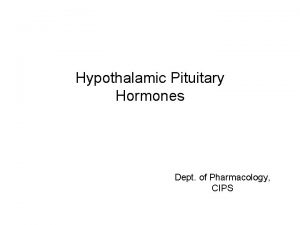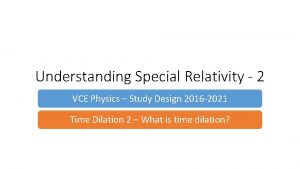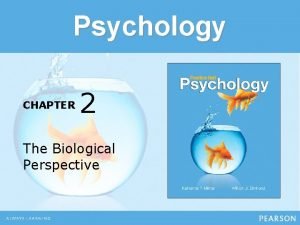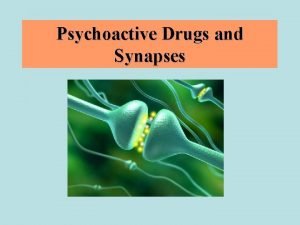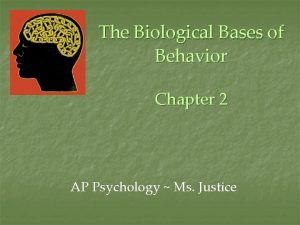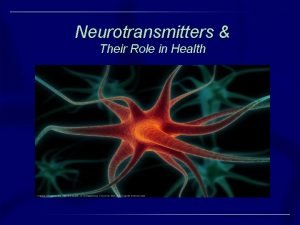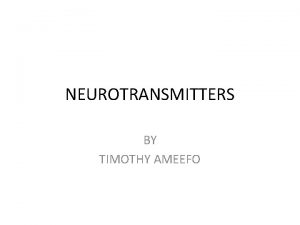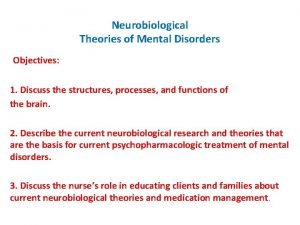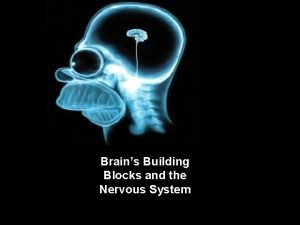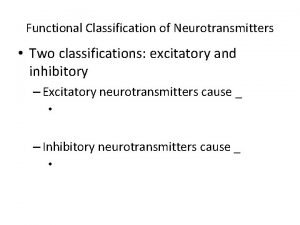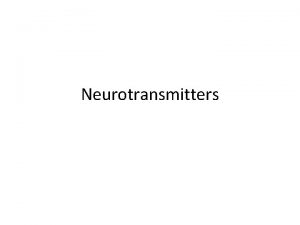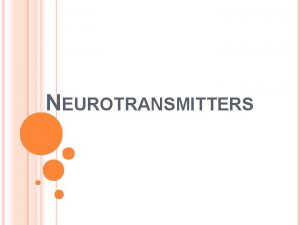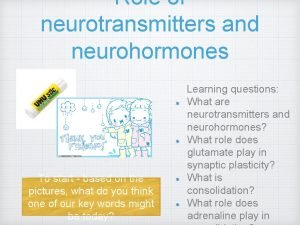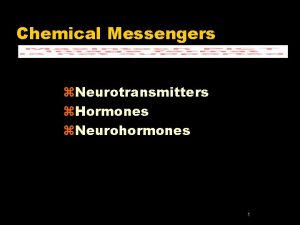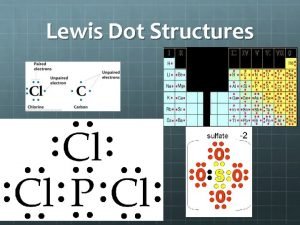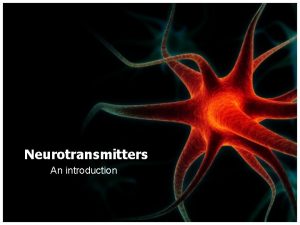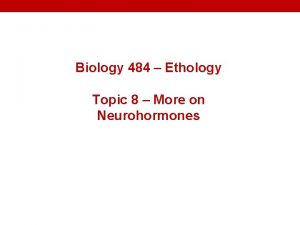VCE PSYCHOLOGY NEUROTRANSMITTERS AND NEUROHORMONES Study design dot




























- Slides: 28

VCE PSYCHOLOGY NEUROTRANSMITTERS AND NEUROHORMONES Study design dot point • The role of neurotransmitters and neurohormones in the neural basis of memory and learning (including the role of glutamate in synaptic plasticity and the role of adrenaline in the consolidation of emotionally arousing experiences).


Neurotransmitters and neurohormones in memory and learning • Some neurotransmitters help memory storage while others can disrupt it. It is known that different types of memory and learning are assisted by the neurotransmitters, glutamate, serotonin and acetylcholine, and the hormone, adrenaline. • Different neurotransmitters tend to have different roles in learning and memory. Researchers have yet to entirely isolate or explain every effect of each one. Generally, they all enable communication of the information being learned and initiate or contribute to important structural changes at the synapse that help ensure the memory is durable and long-lasting when formed

• Some neurohormones also have roles in learning and memory. Like neurotransmitters, neurohormones are chemical messengers that are manufactured by neurons and released from axon terminals. Unlike neurotransmitters, they are not released into the synaptic gap. Instead, they are released into capillaries (tiny blood vessels) where they are absorbed into the bloodstream and carried to target neurons or cells.


Glutamate and synaptic plasticity • Glutamate is the main excitatory neurotransmitter throughout the brain and enhances information transmission by making postsynaptic neurons more likely to fire. • In learning and memory, glutamate plays crucial roles in the synaptic changes that occur. In particular, it promotes the growth and strengthening of synaptic connections between neurons within a neural pathway that subsequently represents the memory of what has been learned. • LTP and LTD are important forms of synaptic plasticity that occur at synapses within several brain regions, particularly areas with significant roles in learning and memory (such as the cerebral cortex, hippocampus and cerebellum). • Given glutamate’s excitatory effect, it has a vital role in LTP and LTD. Generally, the more often that glutamate can excite an adjacent neuron, the more it contributes to LTP (and vice versa for LTD).

• Specific types of glutamate receptors also have to be present on the dendrites of postsynaptic neurons for glutamate to have these effects. • Two of these receptors are commonly called AMPA and NMDA and glutamate has to have an effect on both of them. Without these receptors at the specific sites where glutamate is received, any message carried in glutamate cannot be ‘accepted’ by a postsynaptic neuron. • Generally, AMPA prepares the postsynaptic neuron to accept glutamate then clears out so that NMDA can accept the glutamate. Glutamate will then excite the postsynaptic neuron and convey its message. • In addition, the next time glutamate is released from the presynaptic neuron, it will have a larger excitatory effect on the postsynaptic neuron because of the previous chemical effects it had on AMPA and NMDA. For example, there will be more AMPA receptors so the postsynaptic neuron is more likely to fire in response to presynaptic neurotransmitter release. This chemical process contributes to LTP and can also initiate growth of new dendritic spines on postsynaptic neurons, resulting in additional synaptic connections

Glutamate in Summary • • • Main excitatory neurotransmitter Well know for its role in cognition, learning and memory Glutamate can bind neurons together through synaptic plasticity involved in long term potentiation © Pixabay

Role of adrenaline in the consolidation of emotionally arousing experiences • Lasting memories are not created immediately at the time of a new experience. A period of time is required to ensure the experience becomes long-lasting when transferred to long-term memory for storage. Consolidation is the process by which this is achieved. • Consolidation is the biological process of making a newly formed memory stable and enduring after learning. Time is required after learning takes place to enable the new information to consolidate (‘set’) as a durable long-term memory.

• New incoming information is temporarily stored in short-term memory before its transfer to long-term memory. Research evidence indicates that if consolidation is disrupted, new information may not transfer from short-term to long-term memory or will not be stored well in long-term memory if it arrives there. The outcome depends on the timing of the disruption. Consolidation appears to be a gradual process, and the information being remembered is particularly vulnerable to disruption for at least 30 minutes following learning • The consolidation of information during transfer from short-term to longterm memory can be compared to writing your name in wet concrete. Once the concrete has set (the information has consolidated in long-term memory), your name (the information) is relatively permanently ingrained. But while it is setting (the process of consolidation), it can be interfered with (altered) or erased (completely lost).

• Because consolidation is time-dependent, the process is exposed to various factors that can influence the strength or durability of the memory being formed during the consolidation period. One such factor involves stress hormones, particularly the adrenaline and cortisol secreted by the adrenal glands. • There is considerable research evidence that adrenaline has an important role in the consolidation of specific types of memories. In particular, adrenaline can enhance the consolidation of long-term memories of emotionally arousing experiences. This means that these types of events are more likely to be well remembered (but not necessarily more accurately). • You probably know from personal experience that emotionally significant experiences tend to be well remembered. This is very common for both pleasant and unpleasant events.

• When released during heightened emotional arousal, adrenaline induces the release of noradrenaline (also called epinephrine) in the amygdala, which is located deep within the brain and has a crucial role in emotions. It is believed that the presence of noradrenaline during consolidation may then activate the amygdala to signal to the nearby hippocampus that details of the relevant experience are significant and its long-term storage should be strengthened. • For example, participants given a drug that promotes release of adrenaline when viewing emotionally arousing images will have an enhanced memory of those images compared to control or placebo groups. Conversely, participants given a drug that inhibits the release of adrenaline later have more trouble remembering details of the images

Adaptive Value • Some psychologists have proposed that longer-lasting memories of emotionally arousing experiences, particularly for important or threatening events, has adaptive value as these memories can guide our behaviour in appropriate ways in the future. • However, in other circumstances it can be a problem, such as in the case of post-traumatic stress disorder (PTSD), which is a condition where victims suffer symptoms such as sleep disturbances and flashbacks due to a traumatic event. • people suffering from PTSD are often haunted by memories and images of highly arousing, emotionally traumatic events to a point where it becomes unbearable. The ordeal they underwent keeps resurfacing over and over again. Each time the event resurfaces, adrenaline may be released, thereby maintaining the strength of the memory each time it is reconsolidated

Adrenaline in Summary • • • Adrenalin (epinephrine) can enhance long term memory Important for encoding emotional memories Ensures memory strength relates to memory importance © Pixabay New course available – studying with a crocodile to aid memory: https: //www. youtube. com/watch? v=8 hij 53 lq. EDs

Excitatory vs Inhibitory Stimulating vs Calming © Kristy Kendall & Edrolo 2017

Fast five – Question 1 Which type of neurotransmitter can affect a group of neurons? © Kristy Kendall & Edrolo 2017

Fast five – Question 1 (Answer) Which type of neurotransmitter can affect a group of neurons? Answer: Neurohormone © Kristy Kendall & Edrolo 2017

Fast five – Question 2 Which neurotransmitter is known for its role in memory and learning? © Kristy Kendall & Edrolo 2017

Fast five – Question 2 (Answer) Which neurotransmitter is known for its role in memory and learning? Answer: Glutamate © Kristy Kendall & Edrolo 2017

Fast five – Question 3 Is this neurotransmitter excitatory or inhibitory? © Kristy Kendall & Edrolo 2017

Fast five – Question 3 (Answer) Is this neurotransmitter excitatory or inhibitory? Answer: Excitatory © Kristy Kendall & Edrolo 2017

Fast five – Question 4 Which hormone is said to enhance emotional memory formation? © Kristy Kendall & Edrolo 2017

Fast five – Question 4 (Answer) Which hormone is said to enhance emotional memory formation? Answer: Adrenaline © Kristy Kendall & Edrolo 2017

Fast five – Question 5 True or false: There are no negative effects from too much glutamate in your system. © Kristy Kendall & Edrolo 2017

Fast five – Question 5 (Answer) True or false: There are no negative effects from too much glutamate in your system. Answer: False © Kristy Kendall & Edrolo 2017

Multiple Choice Activity Which of the following is not a role of the neurotransmitter glutamate? A. Glutamate activates the post-synaptic neuron. B. Glutamate produces long-lasting changes to the synapse during long-term potentiation. C. Glutamate is an inhibitory neurotransmitter. D. Glutamate stimulates the release of dopamine which promotes the growth of dendritic spines. © Kristy Kendall & Edrolo 2016

Multiple Choice (Response) Which of the following is not a role of the neurotransmitter glutamate? A. Glutamate activates the post-synaptic neuron. B. Glutamate produces long-lasting changes to the synapse during long-term potentiation. C. Glutamate is an inhibitory neurotransmitter. D. Glutamate stimulates the release of dopamine which promotes the growth of dendritic spines. © Kristy Kendall & Edrolo 2016

Bringing it together NEUROTRANSMITTERS AND NEUROHORMONES Presented by Kristy Kendall Study design dot point • The role of neurotransmitters and neurohormones in the neural basis of memory and learning (including the role of glutamate in synaptic plasticity and the role of adrenaline in the consolidation of emotionally arousing experiences). © Kristy Kendall & Edrolo 2017
 Vcaa psychology study design
Vcaa psychology study design Hypophyseal portal system
Hypophyseal portal system Id root
Id root Outdoor ed study design
Outdoor ed study design Production areas drama
Production areas drama Physics study design
Physics study design English language vce study design
English language vce study design Studio arts assessment criteria 2021
Studio arts assessment criteria 2021 Vce theatre studies study design
Vce theatre studies study design Vcaa technical drawing specifications
Vcaa technical drawing specifications Vcaa english study design 2023
Vcaa english study design 2023 Vce legal studies study design
Vce legal studies study design Vce hhd study design
Vce hhd study design Vce physics poster
Vce physics poster Edrolo psychology
Edrolo psychology Vce psychology scientific poster
Vce psychology scientific poster Vce study score bell curve
Vce study score bell curve Closed dot in graphing inequalities
Closed dot in graphing inequalities Neurotransmitters and their functions
Neurotransmitters and their functions Neurotransmitters and drugs
Neurotransmitters and drugs Neurotransmitters and personality
Neurotransmitters and personality Dot net vs dot com
Dot net vs dot com To what extent can a damaged brain reorganize itself
To what extent can a damaged brain reorganize itself Inhibitory neurotransmitters
Inhibitory neurotransmitters List of neurotransmitters
List of neurotransmitters Inhibitory neurotransmitters
Inhibitory neurotransmitters Reuptake of neurotransmitters
Reuptake of neurotransmitters How do neurotransmitters influence behavior
How do neurotransmitters influence behavior Functional classification of neurotransmitters
Functional classification of neurotransmitters

